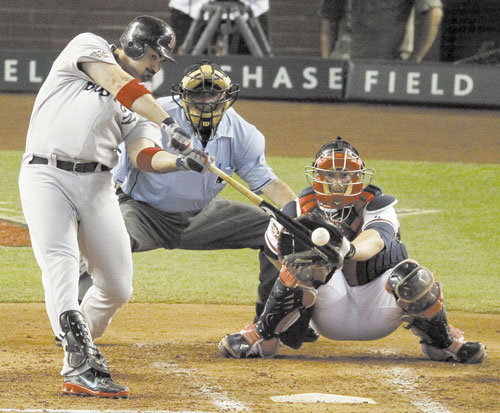On the field at Minute Maid Park in early July, Adrian Gonzalez struck up a brief conversation with Astros third baseman — and son of Boston’s first-base coach — Chris Johnson. A few minutes after, Drew Sutton, Johnson’s friend and former teammate in the Houston system, checked up on how it went.
“I went over to CJ after he talked to him,” recalled Sutton, “and said, ‘Well, what you got?’And he goes, ‘That guy’s on another level. That guy’s way too smart for me.’
“He is.”
Gonzalez’ production for the Red Sox on the diamond has been noteworthy. He leads the American League in hits, average, RBIs and total bases. He’s third in on-base percentage and at the tip of the tongue in every conversation about the league’s most valuable player.
But Gonzalez’ contributions aren’t limited to the field. Several Red Sox marvel at the first baseman’s sophisticated plate approach and constant video scouting, inspiring a similar work ethic in others.
“A great guy to watch is Gonzalez,” said Josh Reddick. “Adrian does so great studying pitchers from day to day and looking at video every day. That’s one guy you can idolize.”
Reddick chatted with Gonzalez nearly a month ago in Pittsburgh about plate approach. Gonzalez divulged how he likes to identify the opposing pitcher’s strikeout pitch and look for it in key spots, adapting if something else comes.
The conversation wasn’t long, but it was productive, as Reddick came up with a few big hits in that series.
“We were out there during batting practice, we talked about (approach) a little bit,” said Reddick. “You do what you can. You take advice from a great hitter. Right now he’s the best in the big leagues.”
Gonzalez doesn’t look at himself as a teacher or mentor to younger players. He’s not sold that his brief conversations with other players are all that revelatory.
“It’s just casual conversations. It’s not like you’re trying to teach anything or pass anything along,” he said. “You’re just having a good casual conversation about hitting — what you know about hitting, what they know about hitting. It’s not necessarily something you’re doing to get a point across. You’re saying, ‘This is what I’m feeling. This is what I should feel.’ “
Gonzalez isn’t the only one who discusses plate approach with his teammates. It’s a regular topic of conversation — all part of being a professional baseball player, said the first baseman.
“It’s what we do. We play ball, so we’re always hanging around, watching video, in the batting cage or on the field taking BP, so we’re going to have conversations throughout the day.”
A newcomer like Sutton appreciates the openness in the clubhouse, something that wasn’t always apparent in some of his former stops.
“When you think of great teams, especially a guy like me who’s coming into a team and doesn’t know a whole lot about it, you wonder how open guys are going to be just talking to you about the game and their knowledge of it,” Sutton said. “It’s a great clubhouse to be a part of. Guys are all pulling for each other. Everybody in here wants to win, so you’re going to try to help your teammates. It always helps when guys are open to teaching.”
Kevin Youkilis said that, although those conversations might not individually signify much, they collectively add up over a season or two.
“Those quick ones aren’t the thing; it’s more over the year, two years, the long haul,” said Youkilis. “The big thing for the young guys is it’s more of a development thing over the year, learning and understanding it more.”
This is a big part of how an organization develops an offensive identity. Sure, the Red Sox focus on players with more patient approaches both in free agency and in the draft. But having those kinds of guys as established veterans who then interact with up-and-comers reiterates how effective that approach at the plate can be.
Not every Red Sox was born with Youkilis’ pedigree of patience. Jacoby Ellsbury and Dustin Pedroia weren’t exactly models of discipline when they first got to Boston, but each has seen their pitches per plate appearance steadily rise to numbers greater than the league average since coming up.
That development doesn’t even require sit-down sessions with veterans. Youkilis admitted his own shyness when he was initially called up to Boston. Hesitant about talking to veterans about hitting, he learned by observation.
“There were so many guys on the team then that I would just watch. I would sit back and watch and try to formulate from what they were doing,” he said. “You can learn by watching guys, how they do little things and why they’re successful, and take those approaches and understand it.”
Gonzalez himself doesn’t take pride in being considered a hitter with a sophisticated approach.
“It’s what I have to do. If I don’t do it, I don’t do well,” he said. “I need to think and prepare and do everything. That’s the way I’ve had success in my career.”
Copy the Story LinkSend questions/comments to the editors.



Success. Please wait for the page to reload. If the page does not reload within 5 seconds, please refresh the page.
Enter your email and password to access comments.
Hi, to comment on stories you must . This profile is in addition to your subscription and website login.
Already have a commenting profile? .
Invalid username/password.
Please check your email to confirm and complete your registration.
Only subscribers are eligible to post comments. Please subscribe or login first for digital access. Here’s why.
Use the form below to reset your password. When you've submitted your account email, we will send an email with a reset code.